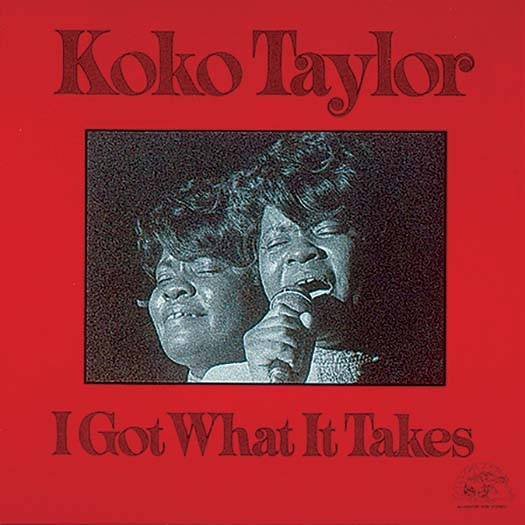Koko Taylor
I Got What It Takes
Chicago's Queen of the Blues, on her debut Alligator album. With Mighty Joe Young and Sammy Lawhorn on guitars, Abbe Locke on sax. Grammy nominee. "One of the blues' best party albums"-LIVING BLUES
Koko Taylor, Vocals
Mighty Joe Young, Guitar
Sammy Lawhorn, Guitar
Abb Locke, Saxophone
Bill Heid, Keyboards
Cornelius Boyson, Bass
Vince Chappelle, Drums
Produced by Koko Taylor, Joe Young and Bruce Iglauer
Recorded at Sound Studios, Chicago
Stu Black, engineer
Alan Hendler, mixing engineer
Cover photos and design by Michael Vollan
Packaging designed for Compact Disc by David Forte
Logo design by Michael Trossman
Thanks to Jim O'Neal, Roy Filson, Jan Loveland, Sam Favors and David Tippett
Special thanks to Bob Koester of Delmark Records
Koko Taylor sings. Blues. Her voice sounds like gravel through a swamp, out-funking frogs and crawdads. A panther's squall through black night can't scare her. She already knows how it sounds.
Hearing Koko Taylor speak is another thing altogether She sounds sweet and cheerful, energetic and demure, all at once. A little shy, too -- and she is. Two sides to the same coin.
Then, there's seeing and feeling Koko Taylor perform. She's D.C. Direct current. High voltage energy -- no hesitation at all to put you right down in blues alley. There's total involvement, total commitment to the truth of the blues. Whether you want to or not -- she'll make you get down.
No choice. She says, "I have to do what I know best -- and what I know best is the blues." She's devoted to the blues and determined to keep her style all her own. "To be different from other female singers -- and to stay where I think I belong, and that is in the real blues bag. I just go ahead and do what I'm doing -- straightforward blues."
The blues is something Koko was born to, and born into, as Cora Walton in 1928 near Memphis. In the best blues tradition, she began singing in church as a child. But it was just the right time to hear the likes of B.B. King, Sonny Boy Williamson, Howlin' Wolf and Elmore James on the radio and it was blues, not gospel music, that attracted young Koko. And, although she remembers hearing the records of Bessie Smith and Memphis Minnie, it was the blues men who inspired her to pursue the blues as a career.
Her blues singing began in earnest only after Koko came to Chicago in 1953. The rough-and-tumble South and West Side neighborhood taverns proved to be her best teacher, because you simply don't get up and sing unless you know you've got what it takes. Several years of gigs under these conditions honed Koko's voice and style, and she cut her first record for the USA label in 1963. Nothing much happened, for Koko or the record, but its producer -- legendary disc jockey Big Bill Hill -- took her to see blues hitmaker Willie Dixon. Dixon, who'd already produced scores of hits with Muddy Waters, Otis Rush, Little Walter and Howlin' Wolf, took Koko under his wing. An extended recording contract with Chess Records followed. One of Dixon's compositions was an immediate smash, and went on to sell over a million copies: the classic Wang Dang Doodle. Ideally suited to Koko's style, voice and delivery, it became her theme song, and, with the success of several other Chess singles (among them, I Got What It Takes and Good Advice ), Koko was on her way to national and international recognition.
Wang Dang Doodle was an instant hit on black radio stations in the mid-sixties and Koko showcased her distinctive voice in black nightspots throughout the South, playing in Memphis, St. Louis, Dallas, Houston and Miami with Jimmy Reed. When the blues fans of Europe discovered the record, Koko was in immediate demand, and European tours have become a regular part of her schedule.
Two rather undistinguished LPs also appeared on Chess -- the problem largely one of unsuitable material -- and Koko parted amicably with the Dixon/Chess aggregation a year or so ago.
Since then, Koko's been back to Europe for the Montreux Jazz Festival and another month-long tour. While in France she cut another album, this one for the Black and Blue label, including her first live concert recording. A recent appearance with Muddy Waters and rock-blues stars Mike Bloomfield, Johnny Winter, Buddy Miles and Dr. John on the National Public Television program Soundstage showed the whole country how Koko can heat up the airwaves with just straight blues. Koko is pure blues, and any ill-founded rumors about those blues fading away don't bother her -- "Not at all. I don't believe the blues will ever die. We're gonna keep it alive!"
-- Amy "Atomic Mama" Van Singel
Co-Editor, Living Blues
Appearing with Koko on this album is a band of veteran musicians hand-picked by Koko herself. Mighty Joe Young is considered one of Chicago's finest guitarists, and has cut three albums of his own for Delmark, Sonet, and Ovation. Sammy Lawhorn spent a decade touring with Muddy Waters before striking out on his own. He's recorded with Muddy, Junior Wells, the Aces, and dozens of other bluesmen. Presently he leads the house band at Theresa's legendary South Side club. Abb Locke hails from Arkansas and since coming to Chicago has been much in demand for West Side club appearances and has recorded with John Littlejohn. Bill Heid appeared on Alligator's Fenton Robinson LP and presently leads his own jazz trio in Baltimore. Cornelius "Mule" Boyson is a graduate of the Bobby Rush band, and has been Joe Young's bassist for almost three years. Vince Chappelle has been Koko's steady drummer for years, with a short vacation during which he toured and recorded with Johnnie Taylor.











